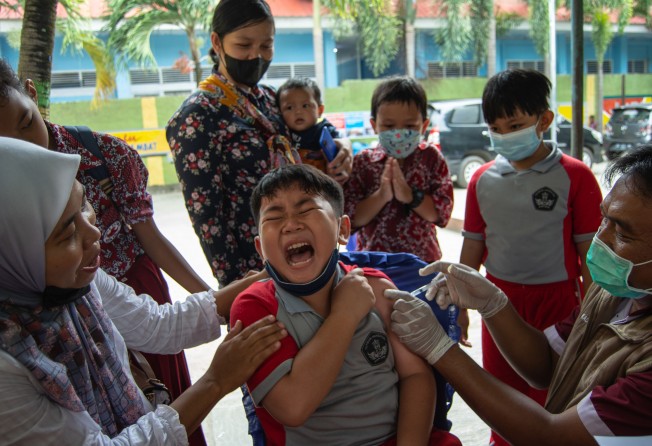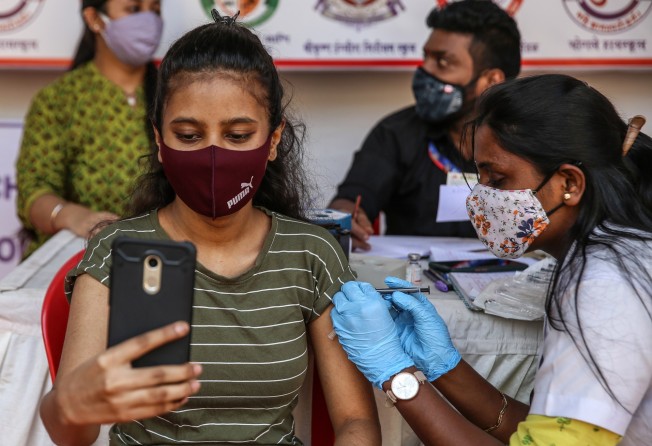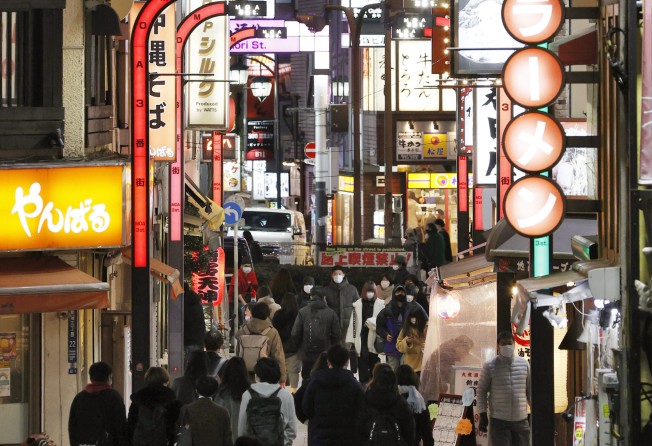
09:02
How Covid-19 could transform our cities of the future

New Zealand Prime Minister Jacinda Ardern said on Thursday that restrictions will be tightened across the country if there is a community transmission of the Omicron variant of the coronavirus but she ruled out lockdowns.
New Zealand’s tight controls and geographic advantage has helped it remain free of the Omicron variant in the community, although many cases have now been reported at quarantine facilities at the border.
A “red” traffic light setting would be imposed within 24 to 48 hours of Omicron arriving in the community, Ardern told a news conference, which would mean masks would be mandated and there would be limits on public gatherings.
“When we have evidence of Omicron sending in the community we will not use lockdowns, instead the whole country will move into Red within 24 to 48 hours,” Ardern said, adding that Omicron would eventually arrive.
“We know from other countries it can take as little as 14 days for Omicron cases to grow from the hundreds into the thousands,” she said.
“It’s a case of when not if, and that is why we need to prepare,” she said.
About 93 per cent of New Zealand’s population over the age of 12 are fully vaccinated and about 20 per cent have had booster shots. Ardern said more people must get boosters.
“International evidence shows that booster doses provide good protection against Omicron,” she said.
New Zealand’s borders have been shut to foreigners since March 2020 and plans for a phased reopening were pushed back from mid-January to the end of February fearing an Omicron outbreak, as seen in neighbouring Australia.
People arriving have to apply for a place at state-managed quarantine facilities. The government this week stopped issuing any new slots amid a surge in the number of people arriving with Omicron.
Ardern said there was no change to border setting plans for now.
More than a million Covid-19 vaccine shots expired in Indonesia before they could be given out, as most of them were donated with a short shelf life.
Of the 1.1 million doses that were thrown out, about 98 per cent were donated just one to three months away from expiry, Health Minister Budi Gunadi Sadikin said in parliament on Wednesday.
As richer nations bought more shots than they could administer, they sought to donate them to places that can distribute them quickly, which meant a rush of shipments to Indonesia toward the end of last year, he added. Going forward, the government will be more selective and only accept doses expiring in three months or longer.
“We will still try to accept these shots considering they’re free and those are good vaccines that we can give to our people,” said Sadikin.
Indonesia needs around 100 million extra vaccine doses for its booster programme, most of which were being met by donations from the Covax facility and the rest via bilateral agreements.
Other nations including Nigeria and Uganda have also had to destroy expired doses due to short shelf lives, posing another challenge to Covax’s efforts to distribute vaccines to poorer nations. Indonesia has administered more than 300 million shots so far, with 44 per cent of its 270 million people fully inoculated.

Thailand will resume a quarantine-free visa programme for vaccinated visitors after its suspension last month helped the tourism-reliant nation curb a new wave of Covid-19 infections.
International travellers can start applying for visas under Thailand’s Test & Go entry programme from February 1, Rachada Dhnadirek, a government spokeswoman, said on Twitter after a meeting of the nation’s main Covid task force on Thursday.
The quarantine-free entry will be extended to applicants of all nationalities, and they will need to undergo two Covid-19 tests, one upon arrival and another on the fifth day, Rachada said.
The decision to ease entry barriers for travellers is in line with the government’s call to treat Covid-19 as endemic this year and efforts to revive the tourism sector that employs millions of people.
While Thailand saw a jump in new cases after the Christmas and New Year celebrations, they are far below their peak during the Delta wave and have yet to overwhelm the health care system.
Thailand has experimented with several plans over the past two years to try to restart the travel sector that used to contribute to about one-fifth of its economy, with 40 million foreign tourists generating more than US$60 billion in 2019.
The Test & Go programme, which previously allowed vaccinated travellers from more than 60 countries to skip quarantine, helped attract about 350,000 visitors in just two months before it was suspended. Authorities have since widened its Phuket Sandbox tourism scheme to three more regions to lure holidaymakers.
The peak in the the current Omicron-led Covid-19 wave engulfing India may be reached on January 24, according to a tracker developed by Indian researchers at the University of Cambridge.
Infections may top out at just under 330,000 daily cases, according to the modelling, with numbers potentially dropping below 300,000 a day by the end of the month.
India registered 317,532 new Covid-19 cases on Thursday, the highest daily infections since May during last year’s Delta-driven wave. Total confirmed infections in India now stand at 38.2 million, with 487,693 deaths.

The Philippines again tops Southeast Asia in daily Covid-19 infections, with record cases last week prompting tighter restrictions, disrupting businesses and filling up hospitals. While the highly contagious omicron variant was detected in most of the region, only the Philippines suffered an exponential rise in infections.
The government blamed the spike on complacency in mask-wearing and distancing during the Christmas holidays, when looser curbs to support a fragile economic recovery allowed families and friends in the Catholic-majority nation to gather, even as the vaccine rate is among the region’s lowest.

Japan’s confirmed daily coronavirus cases on Thursday topped 42,000, setting a new record for the third day in a row as the highly transmissible Omicron variant spreads rapidly across the country.
Japan’s cumulative total of Covid-19 cases also topped 2 million, while many areas have been struggling with what has become the “sixth wave” of infections. The country, which decided Wednesday to expand a quasi-state of emergency to Tokyo and other regions, confirmed its first case in January 2020.
On Thursday, Tokyo confirmed 8,638 daily coronavirus cases, eclipsing the previous record high of 7,377 registered Wednesday. The seven-day rolling average of new infections stood at 5,386.1 per day in the capital.
Japan logged a cumulative total of over 1 million Covid-19 cases in August last year when it was reeling from the “fifth wave” of infections.
Although infection numbers started falling afterward with the progress of vaccination against the virus, there has been another surge in Japan since cases of community transmission of Omicron were confirmed in late December.
Australia’s Therapeutic Goods Administration granted provisional approval for Novavax’s Nuvaxovid vaccine in the nation’s first such move for a protein Covid-19 shot.
The TGA also granted provisional approval to oral Covid-19 treatments from Pfizer and Merck for use on adults who don’t require initiation of oxygen and who are at increased risk of progression to hospitalisation or death.
Separately, Australia’s Sports Minister Richard Colbeck warned that surfing star Kelly Slater has “no chance of getting into the country” for the World Surf League championship unless he is vaccinated, The Sydney Morning Herald reported.
This comes hot on the heels of Australia deporting tennis star Novak Djokovic over his anti-vaccination stance. The newspaper said Slater had yet to reveal whether he is vaccinated.
Reporting by Reuters, Bloomberg